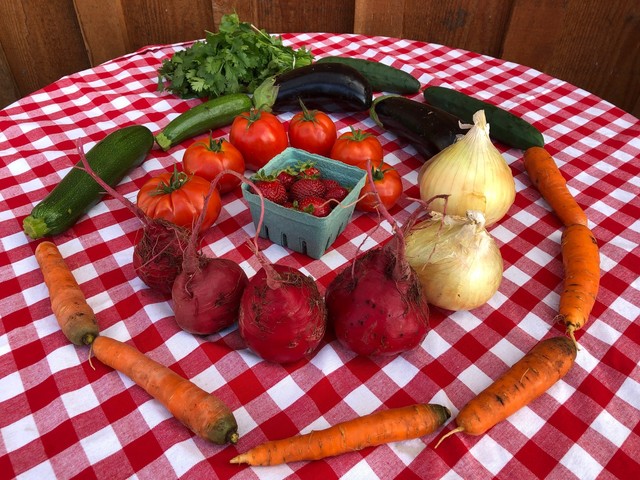- Beets - Red and Chioggia
- Eggplant
- Cilantro
- Carrots
- Cucumbers
- Walla Walla Sweet Onions
- Strawberries
- Zucchini
- Tomatoes
- Heirlooms
On Rotation
- Sweet Corn
For anyone who read last week's newsletter and tried to u-pick on Saturday, I hope you had a good laugh when you discovered we were closed. After all the expounding I did in last week's newsletter about how much I don't know when it comes to farming, with the huge ALL CAPS EXCEPTION that there's one thing I DO KNOW, which is that AUGUST IS THE BEST MONTH FOR U-PICK, well, then we had to call it off this past weekend because the berries didn't ripen due to all the smoke/haze last week. I am truly sorry if anyone drove all the way out to the farm only to find the gate closed (we did put out a post on social media, but I wholeheartedly understand and applaud you if you don't pay attention to that realm). I personally found it perfectly ironic and like all things farming, ever-humbling. Further proof that there's no point in pretending to know, especially in this day and age of climate-in-crisis.
Honestly, in the grand scheme of catastrophic headlines, having to shut the u-pick down for a day probably shouldn't even make the back page of the Capital Press, but it is a sobering/terrifying/devastating reminder of what's afoot just over those hills to our east. All of us who live here - hugging the edge of the giant Pacific, waking up to fog, bundling up against the howling north wind - are largely spared the smoke. The heat. The anxiety of living in a crispy-dry tinderbox ready to explode at even the suggestion of a spark. But it is mere miles away from us, and directly affecting more and more people I know. Dear friends in the Applegate Valley who have grown organic seed crops for 23 years on their land just emailed me to say they've come to the heartwrenching conclusion that they cannot continue to farm there. There's no longer enough water. The heat and the smoke are oppressive and getting worse. Do I know of any pieces of ground on the coast with water rights where they could relocate? Wherever they go they'll be leaving the place that they've homesteaded and farmed for a lifetime, saying goodbye to the hand-built house where their babies were born. Another organic seed farm in Talent - Chickadee Farm - had their irrigation ditch turned off completely this season and without water they had to throw in the towel. They're currently scraping by on GoFundMe donations while they look for new land to the north in the Willamette Valley. My friends, my fellow farmers, are becoming climate refugees. Not in 2050, but now.
My seed rep at High Mowing Organics told me on the phone the other day that all of this is going to affect seed supply this year and in years to come. There will be shortages and plenty of "out of stock" varieties. It means that even if the sky is blue today - almost blue enough that you could turn your back and pretend it's all fine - the affects of climate change will trickle down all the way to my home office this winter, where crop planning and ordering seeds has become a semi-panic stricken ordeal the past few years as I try to source the many different vegetable varieties that fill your Harvest Basket throughout the season.
The United Nations Intergovernmental Panel on Climate Change issued their latest report this week, calling it "code red for humanity." Maybe you don't believe in science. Maybe you think it's all alarmist politics. But I bet you like strawberries on a Saturday in August. I bet you like blue sky. I bet you like the idea of your grandkids thriving on a livable planet. I do, too. I still believe the little things count: If you can bike to your CSA pickup instead of driving today, please do! If you can hang your clothes on the line outside instead of using the dryer, take advantage of that north wind! If you can eat more vegetables and less meat, it will make a difference. And the big things count extra: Governments and companies signing on to binding commitments, investing in renewables, incentivizing the shift away from fossil fuels. We only get this one planet. Maybe, quite possibly, the human presence on Earth will be short-lived. The dinosaurs didn't last forever, either. But I love this place so much I'm not willing to go down without doing what tiny little bit I can. And if everyone did that, tiny + tiny + tiny x a few billion = real change.

